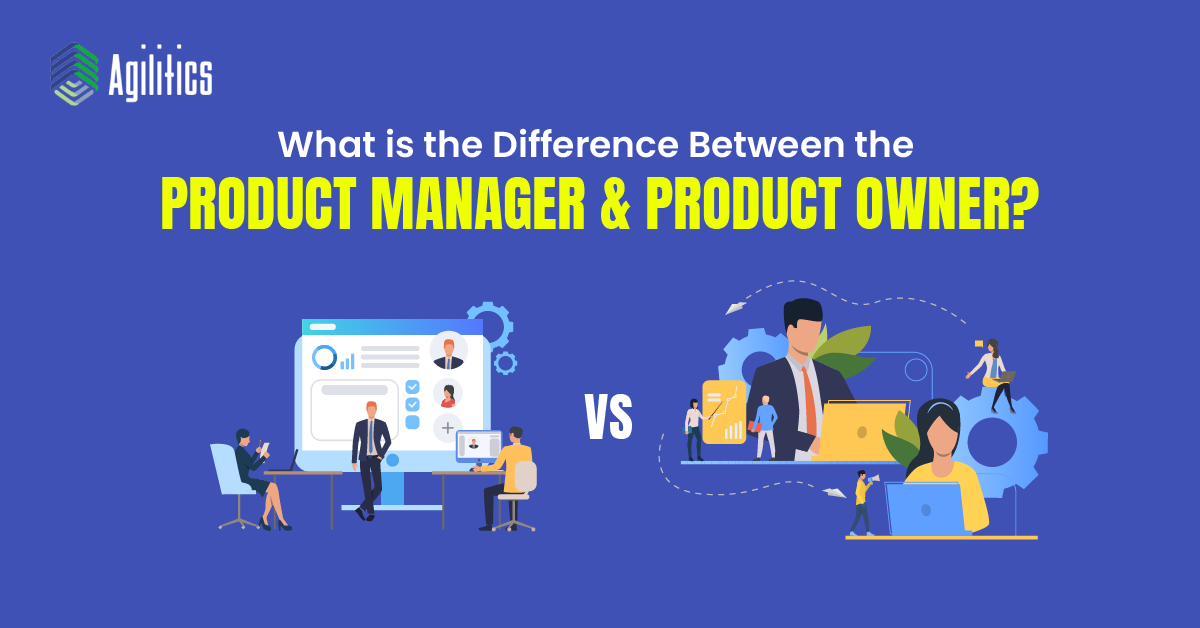The age-old discussion of what is the difference between a Product Manager and a Product Owner still lingers in the streets of this decade. And not just that, questions like who is better, which role ranks higher in the organization, what are their roles & responsibilities, how much they earn, and so on are often asked.
It is important to note that both the Product Manager & the Product Owner work towards the same goal, that is to deliver & create a meaningful product for the customers/end-users, their roles & responsibilities often differ. Want to know how? Read further.
Who is a Product Owner?
A Product Owner is a key member of an agile/scrum team, working towards maximizing the success of a product. As the name might suggest, a Product Owner isn’t a stand-alone professional who makes decisions regarding the products alone, however, a Product Owner is responsible for the successful delivery of the product.
A product Owner acts as the voice of the end users and identifies & prioritizes the requirements for the development team. Since the onus lies on the Product Owner for the successful delivery of the product, it’s their job to communicate the product features with the team and ensure that all customer requirements are being implemented.
Key Responsibilities of a Product Owner
Since the development of a product is not a one-man job, it is done in collaboration between the development team, product owner, and the product manager. The end goal of the entire team is the same, to deliver a great product, but their roles & responsibilities are quite different in the entire product development process.
One of the major responsibilities of a product owner is to manage the product backlog, and that includes:
- Clearly defining the product backlog to everyone involved in the process
- Ordering the product backlog items
- Setting priorities so the important tasks are picked first
- Constantly evaluate & provide feedback to the development team
- Ensure that product requirements & user expectations are communicated to the entire team
If you are feeling motivated to enter the field of product development and want to try your hands at being a product owner, then you can take up a professional scrum product owner training program that will help you kick-start your career as a product owner.
What is Product Management?
Product management is a function in an organization that entails the entire product life cycle, from development to the delivery of the final product. Since the completion & delivery of the product is a long process with multiple teams involved, it calls for a point of contact to manage the entire process as well as the members involved. That point of contact is the Product Manager.
Roles & Responsibilities of a Product Manager
Each organization is different and so are the products they develop, hence it is inevitable for a product manager at X company to have different responsibilities from a product manager at Y company. Product manager responsibilities can vary even within a single organization depending on the specificity of the product.
Let’s go through a product manager’s job description to understand the product manager’s responsibilities in a better light:
- Developing the product roadmap, product vision, and product strategy for the entire team
- Requirement gathering from customers & market and prioritizing them
- Reviewing & providing feedback to the team as well as understanding customer feedback
- Collaborate with the development team, sales team, and key stakeholders to ensure successful delivery of the product
- Overseeing the entire product lifecycle
- Gathering & analyzing data to come up with new ideas for different features
- Documenting the entire product development process
Product Owner v/s Product Manager Salary
The yearly average compensation for a specific profession depends on various factors, the same holds while discussing the salary of a product owner & a product manager. Here are a few important factors that will decide the salary range:
1. Company & Industry
As a product manager or a product owner, your pay scale will be heavily influenced by the company you are working at or the industry you are in. To give you a better understanding, industries such as Information Technology, Internet, or Banking Services will pay a handsome salary while the compensation package from the goods & service industry will not be that lucrative.
The company size & level matter as well, an MNC will provide a more than decent package to a product manager, while a startup wouldn’t be able to afford the same package. Hence the company size and industry will affect your remuneration.
2. Location
Why do people want to move out of their city/town for better opportunities? Because the pay isn’t much in smaller cities. A tier 1 city will pay a lot more for a product manager than a tier 2 city. And not just cities, but countries as well, for example, America has a very different pay scale from Europe for product managers & product owners.
The average Product Manager salary in the United States is $89,956 and the average product manager salary in France is €66,900.
3. Experience
This is one of the most basic factors that are consistent across continents. An entry-level professional will earn less than a mid-level professional. And a mid-level professional will earn less than an experienced professional.
Now that we know the factors affecting the salary range of product managers & product owners, let’s dive into numbers.
Product Manager Salary
Product manager salary as per different countries:
- United States – $113,000
- England – £57,555
- France – €66,900
- Canada – CA$89,643
- Australia – A$1,20,000
- India – INR163,000
Product Manager Salary as per the level of experience:
- Entry-level Product Manager – $57501
- Mid-level Product Manager – $113,000
- Senior Product Manager – $146,072
Product Owner Salary
Product owner salary as per different countries:
- United States – $105,029
- England – £59,238
- France – €53,286
- Canada – $118,568
- Australia – $136,500
- India – INR314,000
Product Owner Salary as per the level of experience:
- Entry-level Product Owner – $67,985
- Mid-level Product Owner – $106,032
- Senior Product Owner – $121,000
The numbers speak for themselves, a career in product development be it as a product owner or a product manager can be highly rewarding. If you are wondering how to become a product manager then we got you covered for that as well!
While the requirements of a Product Manager keep changing from company to company, a standard process of getting into the field will be:
- An undergraduate degree isn’t a must but preferred, most of the senior product managers have a master’s as well
- Take up product management certifications & training programs
- Talk to other product managers in the industry, AKA Networking
- Have a good understanding of technology and tools
- Build excellent communication skills
- Apply for an entry-level Product Manager role
Our Upcoming Training
In this training, our coaches share their decades of experience adopting agile and scrum across startups and Fortune 500 companies worldwide. Join our industry-recognized trainer and be a part of the global community.
| Name | Trainer | Schedule |
|---|---|---|
| Professional Scrum Product Owner | Naveen Kumar Singh | View Schedule |
| SAFe® POPM | Preeth Pandalay | View Schedule |
| Cloud Security Knowledge | Sarbojit Bose | View Schedule |
Frequently Asked Questions
1. Are both the Product Manager & Product Owner required in a company?
It depends on the company and the product they are building. If the product is for internal use then they can do without a product manager, but if they are building a product for customers then they need a product manager.
2. Is a Product Manager the same as the Product Owner?
While the end goal of both the product manager and product owner is to deliver a successful product, their responsibilities are quite different. Though in some small organizations a single person performs the role of both the PO & the PM, it isn’t the case with well-established organizations.
3. Can a Product Owner become a Product Manager?
Yes, a product owner can become a product manager and vice-versa. Though a significant number of responsibilities of a Product Manager & Product Owner are different, a few of them overlap as well. Thus making it easier for a Product Owner to become a Product Manager, and that has been the case with a lot of organizations, especially startups, that cannot afford both, a Product Owner as well as a Product Manager, hence a single person ends up performing the role of both.
We strive to provide business professionals with the skills and knowledge necessary to increase work performance and drive greater return on investment for the global customers we support. Agilitics delivers customized technology and management training solutions to large corporations and government agencies around the world.


